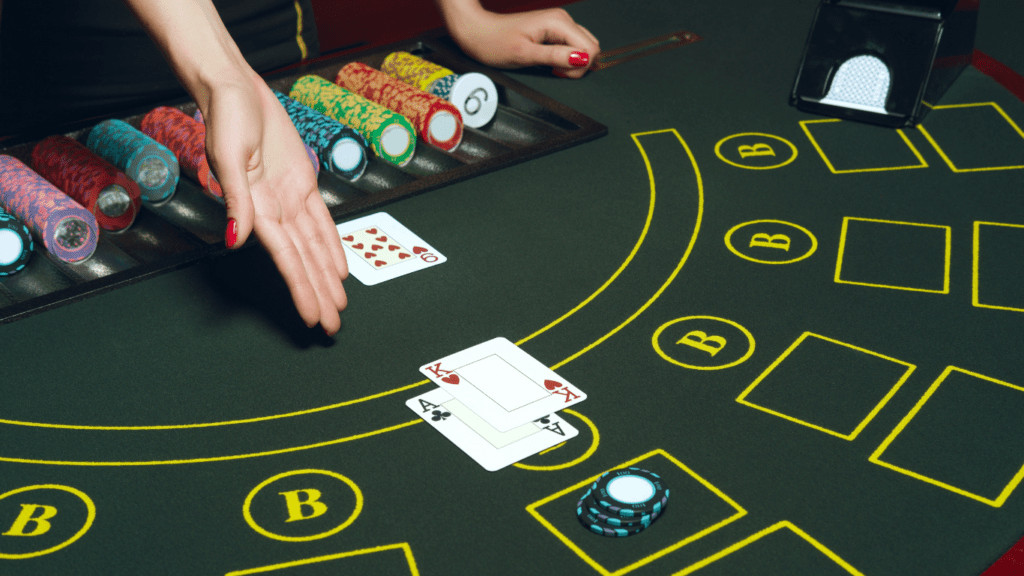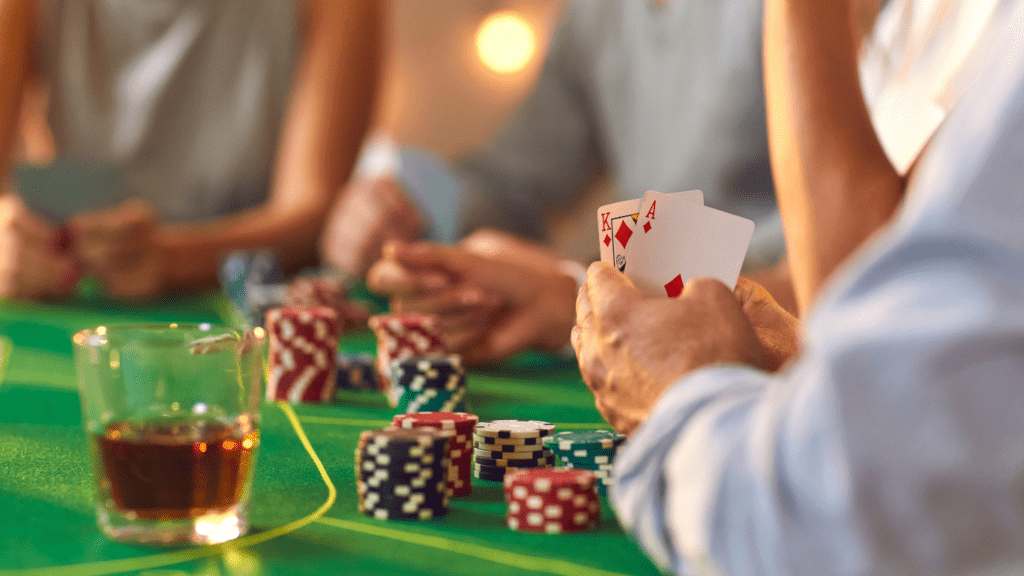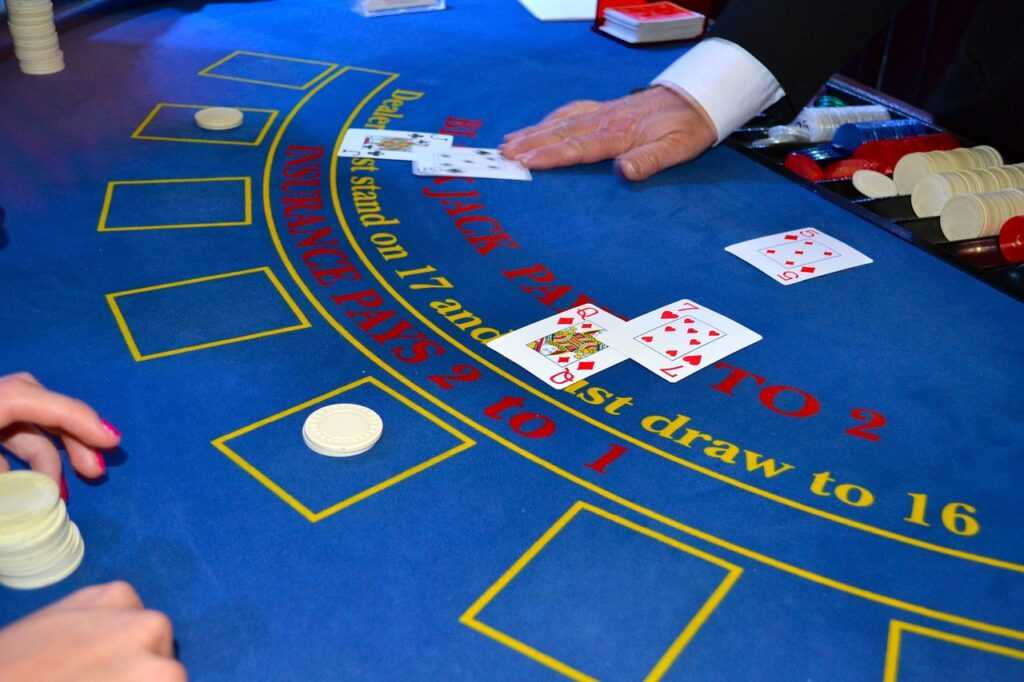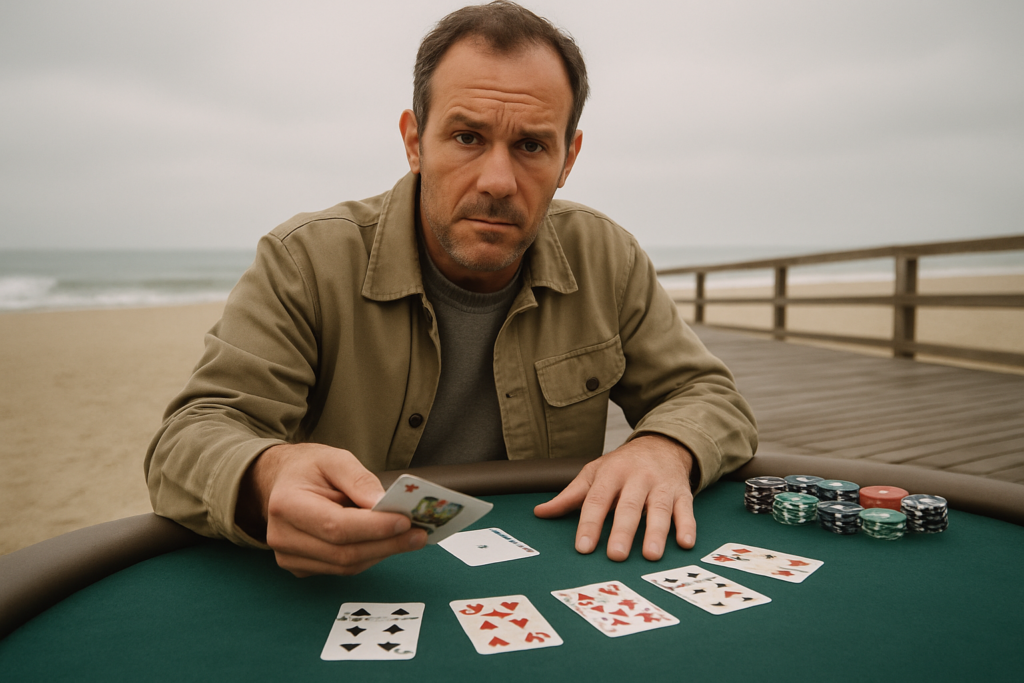Overview of Blackjack
Blackjack is a classic card game found in nearly every casino worldwide. Its objective is to achieve a hand totaling 21 or as close as possible without exceeding it, while still beating the dealer’s hand. Played with one or multiple decks of cards, each card holds a specific value:
- numbered cards equal their number
- face cards are 10
- Aces are either 1 or 11
Understanding the basic strategy can significantly impact success at the blackjack table. This strategy involves knowing when to hit, stand, double down, or split based on the player’s hand and the dealer’s face-up card. Players often follow a chart that outlines these actions for every possible hand combination.
The house edge is another crucial aspect of blackjack. Casinos maintain an advantage by setting the rules, like standing at 17 or forcing players to act first, which means players lose their bet if they bust, even if the dealer busts in the same round.
Consistency plays a key role in mastering blackjack. By adhering to a defined strategy and understanding game dynamics, players can make informed decisions, minimizing losses and increasing potential wins.
Understanding the Basics
Blackjack’s appeal largely stems from its simplicity and strategic depth. Understanding its fundamental concepts is crucial for anyone serious about beating the dealer consistently.
Objective of the Game
The primary goal in blackjack is to achieve a hand value as close to 21 as possible without exceeding it. My focus is on outscoring the dealer, who also attempts to reach this target under specific rules. A round starts with each player receiving two cards and the dealer getting one face-up card. Winning hinges not only on the hand’s value but also on the dealer’s visible card and potential outcomes.
Card Values and Terminology
Cards hold distinct values that impact game decisions. Number cards, 2 through 10, retain their face value, while face cards (king, queen, jack) are counted as 10 each. The ace serves a dual function, valued as either 1 or 11, based on which optimizes the hand. This flexibility is key when forming a “soft” hand (an ace counted as 11) or a “hard” hand (an ace counted as 1). Grasping essential terminology—such as “hit,” “stand,” and “bust”—lays a solid foundation for strategic play.
Mastering Blackjack Strategy

Improving your blackjack game involves more than just luck; it’s about strategy and informed decision-making. Let’s delve into the critical elements of mastering blackjack strategy.
The Importance of Basic Strategy
- A basic strategy forms the backbone of blackjack mastery.
- By adopting a chart-based approach, players can drastically reduce the house edge to almost 0.5%.
- Calculations for these charts use probabilistic models, derived from millions of simulated hands.
- A chart indicates the optimal move for every possible hand, considering your cards and the dealer’s face-up card.
- Following this strategy consistently, I notice how my decisions become more statistically sound, boosting my success rate.
Counting Cards: Myth or Reality?
Card counting in blackjack is controversial yet a fascinating topic. While often portrayed as a foolproof method to beat the dealer, it’s not as simple as Hollywood suggests. Card counting aims to deduce the remaining cards in the deck, helping players judge whether the next hand favors them. While legal, casinos discourage this practice, using multiple decks and shuffling strategies to counter it. In my experience, card counting demands a sharp memory and intense concentration, but when executed correctly, it can slightly shift odds in your favor.
Advanced Techniques
Developing a deeper understanding of advanced techniques in blackjack can significantly influence your success at the table. Mastering strategies like splitting and doubling down, as well as grasping the concept of house edge, enhances your decision-making and accuracy.
Splitting and Doubling Down
A key aspect of advanced blackjack play involves making informed decisions about splitting and doubling down. When holding a pair, splitting lets you create two separate hands, each receiving an additional card. For example, splitting a pair of eights against a dealer’s six often improves your odds. Doubling down, on the other hand, allows you to double your initial bet in exchange for receiving just one more card. This tactic is optimal with a hand totaling 11 against a dealer’s lower card. I consider these moves essential because they significantly impact your potential returns when executed correctly.
Understanding House Edge
The house edge represents the casino’s built-in advantage over players. In blackjack, various rule changes can shift this edge, with some games offering lower edges thanks to favorable conditions, such as fewer decks or allowing early surrender. Even slight variations can alter the player’s odds. By thoroughly understanding these elements, you can evaluate table rules and choose games that maximize your potential for profit.
Common Mistakes to Avoid
Navigating blackjack strategy requires avoiding common pitfalls that can drastically affect results. Recognizing these errors prevents unnecessary losses and reinforces strategic play.
Chasing Losses
Many players react impulsively to consecutive losses by increasing their bets in hopes of recovering quickly. Chasing losses can lead to greater financial setbacks, as emotional decision-making often clouds judgment and leads to further mistakes. To maintain composure, I stick to a predetermined betting strategy that aligns with my bankroll, ensuring I don’t deviate from the plan under pressure.
Ignoring Table Etiquette
Proper table etiquette greatly enhances the playing experience. Ignoring etiquette frustrates dealers and fellow players, potentially causing distractions. I always follow dealer instructions, handle chips correctly, and minimize disruptions by waiting my turn. Respecting these unwritten rules creates a positive atmosphere for everyone at the table.
Tips for a Successful Gameplay
Maximizing success in blackjack requires more than just knowing the rules; it involves strategic choices and disciplined play. Here are some tips to enhance your chances of winning.
Bankroll Management
Effective bankroll management can significantly influence gameplay outcomes. I never gamble with money I’m not prepared to lose. Setting a budget for each session helps me avoid impulsively betting beyond my means. For example, dividing my bankroll into smaller units allows me to withstand streaks of bad luck without depleting funds quickly. Tracking wins and losses accurately keeps my play consistent and responsible.
Choosing the Right Table
Selecting the right table plays a crucial role in achieving success. I always look for tables with favorable rules, such as those allowing double down on any two cards or offering payouts of 3:2 for a natural blackjack. It’s important to assess table limits to ensure they align with my bankroll. In a crowded casino, quieter tables often provide a more focused environment, enhancing strategic play.



 Community Engagement Manager
Raymundo Stricklandics serves as the Community Engagement Manager for Dice Gamblers Deal, where he is dedicated to creating meaningful connections with the platform’s audience. His role focuses on fostering an active, engaged community of players by interacting with readers, answering their questions, and ensuring their experience with the site is both enjoyable and informative. Raymundo is deeply passionate about building relationships with fellow gambling enthusiasts, whether through social media, email communications, or direct interaction on the site’s forums. He works tirelessly to ensure that the platform not only provides valuable information but also offers a supportive space where players can share their experiences, tips, and success stories. Raymundo also plays a key role in customer support, addressing user inquiries and providing personalized advice to help players navigate the world of table games and betting strategies.
Community Engagement Manager
Raymundo Stricklandics serves as the Community Engagement Manager for Dice Gamblers Deal, where he is dedicated to creating meaningful connections with the platform’s audience. His role focuses on fostering an active, engaged community of players by interacting with readers, answering their questions, and ensuring their experience with the site is both enjoyable and informative. Raymundo is deeply passionate about building relationships with fellow gambling enthusiasts, whether through social media, email communications, or direct interaction on the site’s forums. He works tirelessly to ensure that the platform not only provides valuable information but also offers a supportive space where players can share their experiences, tips, and success stories. Raymundo also plays a key role in customer support, addressing user inquiries and providing personalized advice to help players navigate the world of table games and betting strategies.
